 Petzlover
Petzlover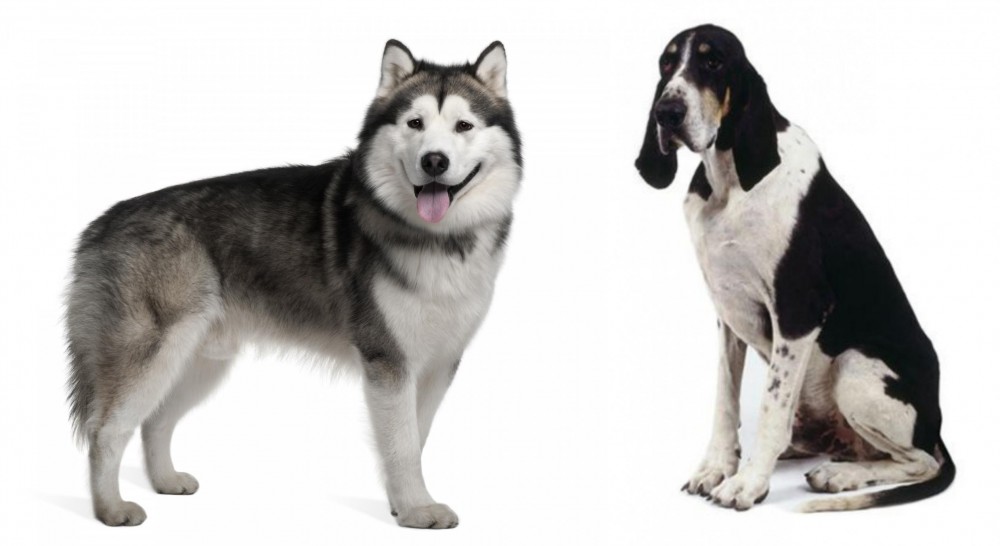 Alaskan Malamute is originated from United States but Grand Anglo-Francais Blanc et Noir is originated from France. Alaskan Malamute may grow 8 cm / 3 inches shorter than Grand Anglo-Francais Blanc et Noir. Alaskan Malamute may weigh 7 kg / 16 pounds more than Grand Anglo-Francais Blanc et Noir. Alaskan Malamute may live 3 years more than Grand Anglo-Francais Blanc et Noir. Both Alaskan Malamute and Grand Anglo-Francais Blanc et Noir has almost same litter size. Alaskan Malamute requires High Maintenance. But Grand Anglo-Francais Blanc et Noir requires Moderate Maintenance
Alaskan Malamute is originated from United States but Grand Anglo-Francais Blanc et Noir is originated from France. Alaskan Malamute may grow 8 cm / 3 inches shorter than Grand Anglo-Francais Blanc et Noir. Alaskan Malamute may weigh 7 kg / 16 pounds more than Grand Anglo-Francais Blanc et Noir. Alaskan Malamute may live 3 years more than Grand Anglo-Francais Blanc et Noir. Both Alaskan Malamute and Grand Anglo-Francais Blanc et Noir has almost same litter size. Alaskan Malamute requires High Maintenance. But Grand Anglo-Francais Blanc et Noir requires Moderate Maintenance
 Alaskan Malamute is one of the oldest breeds. Thousands of years ago, native people in the land between Alaska and Siberia. From the beginning, this breed is used as working dogs. Alaskan Malamute was a perfect dog for seal or bear hunting, and sledding supplies back home. During the gold rush, this breed became even more popular, and that popularity only grew over the years. They have been popular even during the war years. Army used them as sled dogs in the war.
Alaskan Malamute is one of the oldest breeds. Thousands of years ago, native people in the land between Alaska and Siberia. From the beginning, this breed is used as working dogs. Alaskan Malamute was a perfect dog for seal or bear hunting, and sledding supplies back home. During the gold rush, this breed became even more popular, and that popularity only grew over the years. They have been popular even during the war years. Army used them as sled dogs in the war.
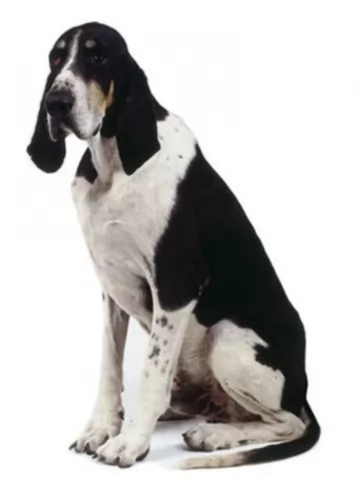 Known also as the Great Anglo-Francais, White and Black Hound or the Grand Anglo, the Francais Blanc et Noir is one of several breeds of hounds.
Known also as the Great Anglo-Francais, White and Black Hound or the Grand Anglo, the Francais Blanc et Noir is one of several breeds of hounds.
The dog was bred by crossing French scenthounds with English Foxhounds.The Grand Anglo-Français Blanc et Noir has always been used for hunting. As a scenthound, hunting was always done in packs and he thrilled at the chase.
The large dog originates in France and is recognized by the French Kennel Club as well as the Federation Cynologique Internationale.The purpose of this breed standard is to provide guidelines for breeders wishing to maintain the quality of their breed, but to also improve it.
 Average weight of Alaskan Malamute variates from dog to dog, but male weights 37-39kg, while female weight is 32-34kg. An average height of the male is 62-64cm, while females are slightly smaller with a height of 56-58cm.
Average weight of Alaskan Malamute variates from dog to dog, but male weights 37-39kg, while female weight is 32-34kg. An average height of the male is 62-64cm, while females are slightly smaller with a height of 56-58cm.
A lifespan of this breed is 12-15, but if your dog is healthy with the balanced diet they tend to live much longer.
Litter Size of Alaskan Malamute is 4-8 puppies, but this depends on every dog.
Other Names for Alaskan Malamute are Mal and Mally
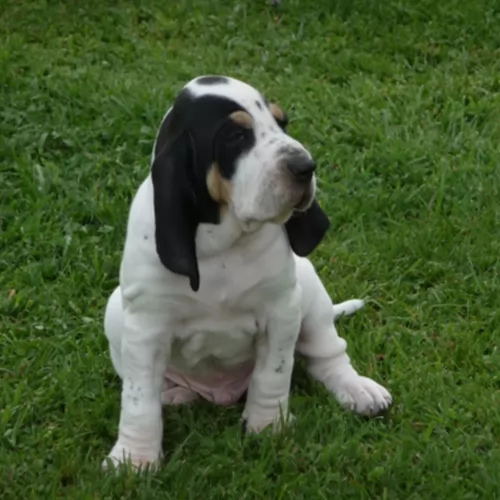 The Grand Anglo – Francais Blanc et Noir is a big, powerful dog standing at 62 – 72cm and weighing 27 - 32kg. His chest is broad and deep.
The Grand Anglo – Francais Blanc et Noir is a big, powerful dog standing at 62 – 72cm and weighing 27 - 32kg. His chest is broad and deep.
The head is flat and broad, the nose black with gentle looking brown eyes. The coat is short and dense for protection and the coloring is black and white. There is a tan dot above each eye. The ears are floppy. The tail is long and tapers down to a slender point.
As a superb hunting dog, this breed lives for the hunt and loves nothing more than to be chasing its prey. The dog has an excellent sense of smell and can track prey in all kinds of terrain.
Although the dog has a stable temperament, he isn’t recommended as being kept solely as a pet, even though he is gentle with children. Maybe its because he has a more serious personality and would prefer to live with active, sport-loving adults than having to contend with the antics of children.
He also isn’t the best dog to have around other small pets as he is so prey-driven he may well be aggressive towards them.
He isn’t a city-loving dog and with his high energy levels he is best suited to properties with large gardens or to farm life. While he will bark and alert you to strangers, he won’t make a particularly good watchdog as he isn’t aggressive.
 Alaskan Malamutes are playful dogs that love running, playing and spending time outside with their family. They would greet anyone who comes to your house, no matter if they are first-time visitors. That makes them bad watchdogs. Since they are a pack breed, they love spending time with humans and they love being included in activities. Generally speaking, they are great with children. They have a lot of patience for the little ones in your family. If they are socialized properly, you will not have any problems with other animals. They love playing and spending time running around, so you will not have to worry. They might run towards cats, so you have to be careful. Alaskan Malamute is not very easy to train because they are very intelligent and stubborn breed. Not very recommendable for new owners. The best way to train your puppy is with patience, consistency and positive awarding. They do not like the old-fashioned way of punishment with beating included. Instead, rather try being positive and give your dog nice treat when the task is completed.
Alaskan Malamutes are playful dogs that love running, playing and spending time outside with their family. They would greet anyone who comes to your house, no matter if they are first-time visitors. That makes them bad watchdogs. Since they are a pack breed, they love spending time with humans and they love being included in activities. Generally speaking, they are great with children. They have a lot of patience for the little ones in your family. If they are socialized properly, you will not have any problems with other animals. They love playing and spending time running around, so you will not have to worry. They might run towards cats, so you have to be careful. Alaskan Malamute is not very easy to train because they are very intelligent and stubborn breed. Not very recommendable for new owners. The best way to train your puppy is with patience, consistency and positive awarding. They do not like the old-fashioned way of punishment with beating included. Instead, rather try being positive and give your dog nice treat when the task is completed.
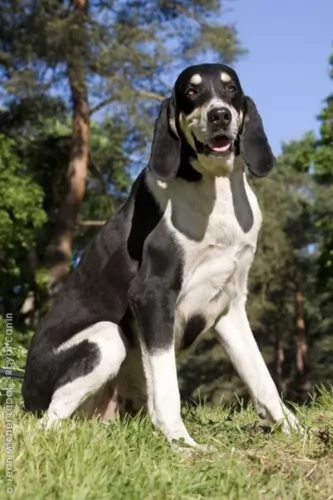 Essentially known as a pack dog, the Grand Anglo-Français Blanc et Noir isn’t going to do well with anyone who lazes on the couch all day.
Essentially known as a pack dog, the Grand Anglo-Français Blanc et Noir isn’t going to do well with anyone who lazes on the couch all day.
He is energetic and driven, and will develop all kinds of behavioral issues if not properly and adequately exercised.
Fitting into a household where hunting is part of the lifestyle will be ideal for him, loving the outdoors and the stimulation that comes from hunting with other dogs.
Provide him with an outdoorsy, active owner and this hunting dog will ensure that he is your loyal and loving companion.
 Usually Alaskan Malamute is a very healthy breed. They do not have any major issues but like every other breed, they can develop some illness. Cataracta, Chondrodysplasia, and hip dysplasia are the most common health issues, but you shouldn’t be worried because they are not happening all the time. You must talk with people who are giving you the puppy to examine the genetics. With healthy breed, and regular vet checks you will have a happy and a healthy dog for a long time.
Usually Alaskan Malamute is a very healthy breed. They do not have any major issues but like every other breed, they can develop some illness. Cataracta, Chondrodysplasia, and hip dysplasia are the most common health issues, but you shouldn’t be worried because they are not happening all the time. You must talk with people who are giving you the puppy to examine the genetics. With healthy breed, and regular vet checks you will have a happy and a healthy dog for a long time.
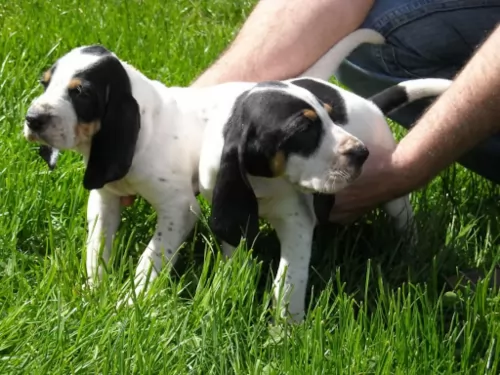 Capable of reaching 10 to 12 years of age when looked after well, there aren’t any specific health issues with this dog. He is likely to experience one or two issues that other dogs have to contend with as well.
Capable of reaching 10 to 12 years of age when looked after well, there aren’t any specific health issues with this dog. He is likely to experience one or two issues that other dogs have to contend with as well.
There are one or two diseases that you want to be aware of -
This dog has long, floppy ears and this means that air doesn’t reach inside the ears properly. He is therefore prone to ear infections. After he has been swimming, dry his ears gently inside.
Unfortunately this is a disease that can strike even when your Grand Anglo-Francais Blanc et Noir is a puppy. Hips which aren’t formed properly can cause stiffness, pain and lameness in your pet.
 Feeding of your Alaskan Malamute depends on various things. Metabolism, size of the dog, age, quality of the food, build and activity. So you have to understand your dog's needs. Overall, 4-5 cups of high-quality dry food would be enough. Of course, you can give your dog some fruit or vegetables too, as a treat. If your dog likes to spend most of the day on the couch, you don’t have to feed it as much as people who have more active dogs.
Feeding of your Alaskan Malamute depends on various things. Metabolism, size of the dog, age, quality of the food, build and activity. So you have to understand your dog's needs. Overall, 4-5 cups of high-quality dry food would be enough. Of course, you can give your dog some fruit or vegetables too, as a treat. If your dog likes to spend most of the day on the couch, you don’t have to feed it as much as people who have more active dogs.
Developing puppies need more food than an adult dog. They should eat 3-5 times per day, of high-quality puppy food. Puppy food contains more nutrient that will help to develop your dog into a healthy adult.
Grooming Alaskan Malamute may be little challenging. They have a lot of hair, so regular brushing is a must. 2-3 times a week at least. They shed a lot 2 times a year, and you will have to use vacuum-cleaner every day.
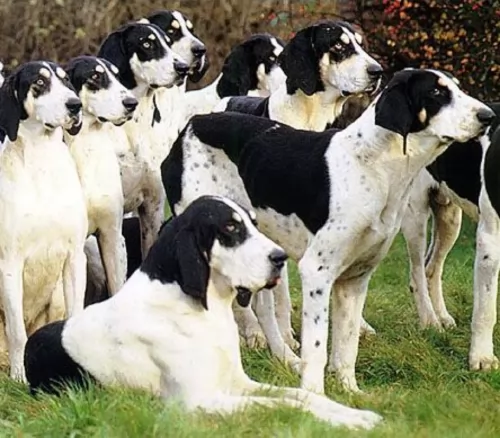 With his short coat and being an average shedder, the Grand Anglo-Francais Blanc et Noir is an easy dog to groom, requiring a brush twice a week.
With his short coat and being an average shedder, the Grand Anglo-Francais Blanc et Noir is an easy dog to groom, requiring a brush twice a week.
Check his ears inside and out, particularly if he goes swimming. Excess moisture in the ear can encourage bacteria and ear infections. See that his nails are trimmed and remember to check his teeth for dental disease which can cause ill health generally.
As a hunting dog, he will need a good deal of exercise. He won’t be content to just go for a walk once a day, but will want something more hectic such as joining you as you go hiking, cycling, swimming or jogging.
As a scenthound, your Grand Anglo – Francais Blanc et Noir is always out and about sniffing around looking for a tasty treat, but with these active dogs, the secret is to small, frequent meals as apposed to 1 or 2 large meals.
It is important to see he gets a nutritionally complete balanced diet that gives him slow release energy. Check with your vet if you’re unsure what to feed him. You want to avoid foods high in fillers, colorants and preservatives.
There are some excellent commercially manufactured dog foods for high energy dog,s but make sure to go for the best brands. You can mix his kibble with some raw meat occasionally and also give him cooked brown rice, chicken and vegetables. He’ll need a constant supply of fresh, cool water.